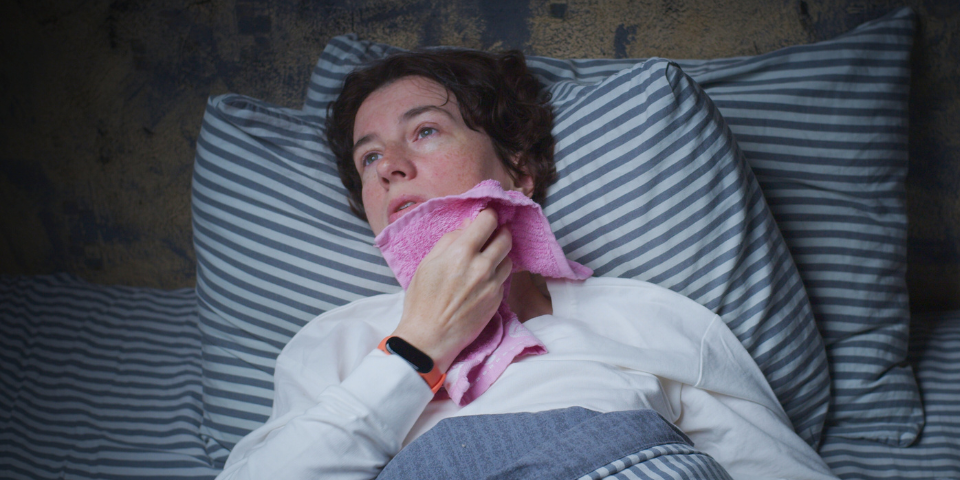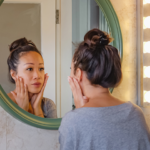[ad_1]
Has waking up in a sweat become a nightly ritual? Consider this your cue to find a solution. Because night sweats aren’t just annoying (and put a strain on your barrier); if experienced often enough, it can be detrimental to your health.
“They can disturb your sleep by disrupting your mood. You eat more when you’re not sleeping, and your metabolism changes, which can lead to weight gain. All of these things can be an effect of night sweats,” he said. Nanette Santoro, MDProfessor of Obstetrics and Gynecology at the University of Colorado School of Medicine, who studies menopause-related treatments.
If you’re already struggling with the negative effects of night sweats, rest assured that it’s never too late to turn things around. Read on to learn why night sweats happen and how to reduce night sweats naturally.
What causes night sweats?
There are a number of reasons why you might wake up sweaty, many of which have to do with your hormones. Here are the most common causes of night sweats.
1. Hormonal imbalance
One of the factors that contribute to night sweats is hormonal imbalance, especially during menopause and perimenopause. “Night sweats are one of the most common symptoms of menopause up to 80 percent of women at some point in transition,” says Dr. Santoro. However, night sweats can occur at any stage of a woman’s reproductive life, from puberty to postmenopause.
The culprit here is estrogen, which not only regulates the menstrual cycle, but also helps regulate the body’s core temperature. Research shows Fluctuations in estrogen levels associated with menopause effectively confuse your body’s internal thermostat in the hypothalamus.
As a result, your brain can sense temperature changes when there aren’t any. So estrogen levels, which helps to cool the body temperaturedrop it arbitrarily, and your brain falsely interprets it as a rise in core temperature, triggering the sweat response to cool the body when it’s not needed.
2. Mood stabilizers
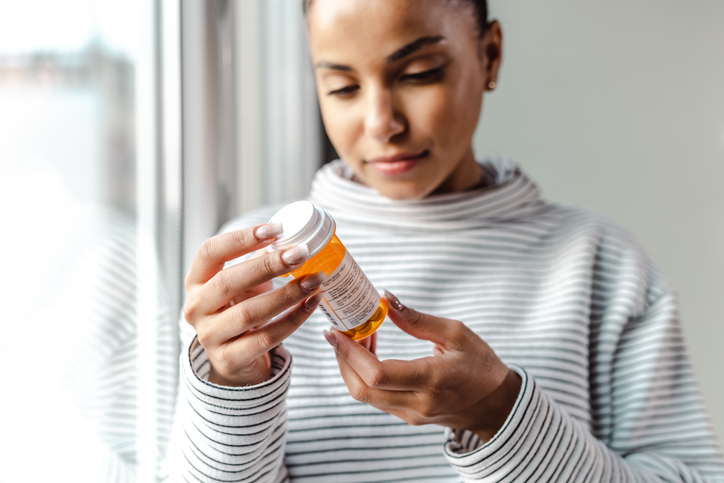
Sometimes there is a mood stabilizer for the treatment of night sweats. “But the same thing we use to treat night sweats can sometimes cause sweating,” notes Dr. Santoro.
It’s not clear why, but Dr. Santoro says that some antidepressants affect the part of the brain that causes night sweats, causing sparks rather than affecting brain chemistry.
3. Thyroid function
In some people, the butterfly-shaped thyroid gland in the front of the neck produces more hormones than necessary. Hormones produced by the thyroid gland help regulate metabolism, which is how your body converts food into energy. But when you have an excess of these hormones in your system, many processes speed up, including rapid heart rate, unexplained weight loss, panic attacks, and excessive sweating.
4. Fever
Various infections such as colds, flu, and chicken pox can lead to fever, increased body temperature at night, and excessive sweating. These magics of night heat are part of you efforts of the immune system fight infection.
5. Low blood sugar
Sometimes I wake up hungry and sweat? You may have low blood sugar. This is when your serum glucose (blood sugar) level drops below normal can hit if you skip dinner, exercise during the day, or drink alcohol before bed.
If blood sugar is too low the body mobilizes helps restore adrenaline and cortisol. These are the same hormones that trigger the “fight or flight” response during times of stress by increasing the heart rate, releasing glucose into the blood, and providing energy in response to threats.
Along with this response, sweating helps regulate body temperature. So, although rare, your body will perceive a lack of nutrition as a stressor and respond accordingly.
6. Alcohol consumption

Relax with a glass of wine before bed and you’ll rest in a sweat. Alcohol This causes the blood vessels to relax and widen (known as vasodilation), causing the heart to beat faster as the heart pumps harder to maintain blood flow.
This warms and flushes your skin as more blood flows to the surface, which in turn stimulates sweat glands to release heat. And the more you drink deeper this effect can be.
Damage to your body’s internal conditioning can be caused by the cost of all this vascularization: a decrease in core temperature Because all that warm blood goes to the surface.
So not only is your skin getting hotter and sweatier, but your core temperature is also dropping, an effect that can be exacerbated as the body tries to rebalance between core and peripheral temperatures.
7. Substance withdrawal
Alcohol and drugs can not only increase the heart rate – these substances can same effect Dr. Santoro says it causes night sweats when they try to quit.
This is because your nervous system has become accustomed to the way it worked while using the substance and now needs to adapt to a new state. Increases heart rate, blood pressure, and temperature, and stimulates the body’s cooling sweat response.
8. Chronic sweating
Some people naturally sweat more. Chronic sweating tends to run in families, and the nerves that control sweat become oversensitive, causing the glands to produce more sweat than normal.
If you suffer from chronic sweating, you may sweat profusely throughout the day and night. However, Dr. Santoro notes that having fewer distractions at night can make sweating more noticeable when you’re trying to sleep.
9. Vitamin B12 deficiency
Up to 15 percent of us get too little vitamin B12, which is important for red blood cell production and nerve function. In extreme cases, a deficiency may occur will contribute to increasing activity the sympathetic nervous system, which causes excessive sweating.
If you think you are experiencing adverse effects due to a medication, substance problem, or physiological function, you should consult a healthcare professional.
How do you know if you are sweating abnormally?
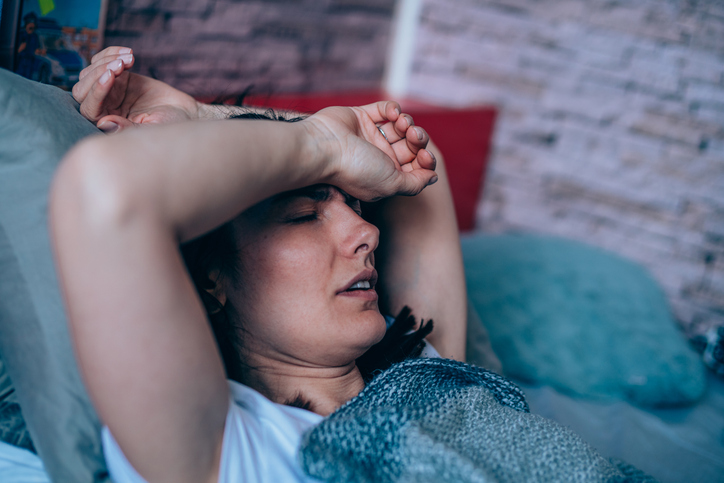
There are some differences between night sweats and normal sweats.
Duration
Normal sweating tends to be continuous. “If you’re sweating, (the environment) is hot, you’re usually sweating more,” Dr. Santoro said. So, if your bedroom is a blast furnace and you’re sweating, the sweat will continue until you get your feet out from under the hood or open the window.
Night sweats, on the other hand, are often spasmodic. “Like hot flashes, night sweats come on suddenly and then go away,” says Dr. Santoro. In fact, the two can often accompany each other, and this rhythm repeats periodically throughout a night’s sleep or multiple nights of sleep.
Energy
If you’re awake during night sweats, you may feel an intense heat that starts in your head and moves down your body. (If you’re not awake during night sweats, that’s another way to distinguish them from regular sweats.) Anyway, as the sensation subsides and your body temperature returns to normal, Dr. Santoro says, you may start to feel chilly.
Plus, unlike normal sweating, you sweat profusely, get wet, and have to change clothes. You may also notice that your heart rate increases and your skin flushes.
5 Natural Ways to Get Rid of Night Sweats
There are several lifestyle strategies that can help reduce night sweats—of course, it’s worth seeing a healthcare provider to find out what’s causing them. While natural remedies can help in many cases, some people may need more specialized help to treat a medical condition.
With that in mind, here are some behavioral changes you can make to help you sleep drier through the night.
1. Avoid diet reasons

Certain foods can trigger night sweats, including:
- Spicy food Chili peppers contain natural compounds like capsaicin, which trick your body into thinking it’s overheating. It stimulates the cooling response, which increases sweat production.
- Caffeine stimulates your nervous system, which causes your body temperature to rise. He too sensitizes nerves It controls your sweat glands so you sweat more easily.
- AlcoholAs mentioned earlier, blood vessels dilate, bringing more blood to the surface of the skin, making it warm and red. In turn, your body may sweat to cool itself down.
- Hot drinks cocoa, tea and coffee raise your internal temperature; Your body will counteract this by activating the sweat response.
To reduce the likelihood of night sweats, avoid these dietary triggers right before bed.
2. Reduce stress
Effective stress management helps regulate body temperature has been found Increase the stress response, especially in the skin. A simple step you can take is to take a breather pause throughout the day reduce stress.
When you are stressed, your heart and breathing speed up. By deliberately slowing down your breathing, you are telling your body to stop and react to the stress. Aim to take a few minutes to breathe slowly and deeply in the morning, mid-day, and before bed.
3. Choose Add-ons*
Some natural ingredients help fight stress and anxiety.
However, some supplements may interact with medications or medical conditions, so check with your doctor before trying one.
4. Take a cold or warm shower
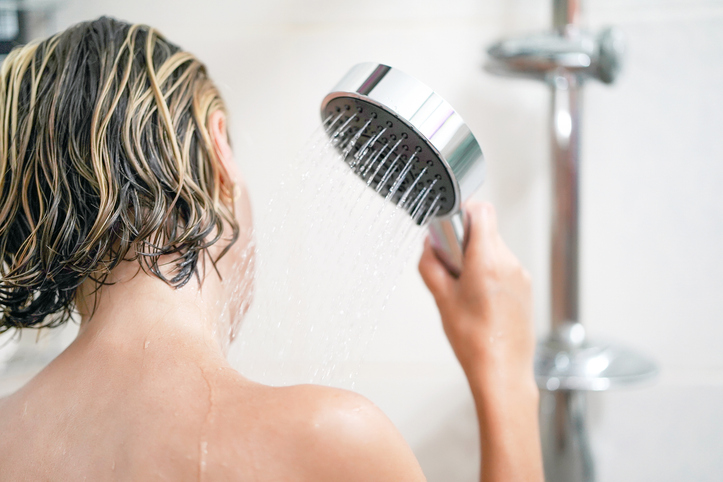
Dr. Santoro says that exposing your body to high heat (such as in a hot shower) increases the likelihood of night sweats. If you shower right before bed, keep the water warm or even cold to prevent a sudden rise in body temperature. If this isn’t part of your routine, try taking a cool shower before bed.
5. Cool your environment
Keep your bedroom cool to prevent night sweats.
- Use a fan, open a window, or turn on the air conditioner.
- Cooling accessories in the bedroom can also help. “Some of my patients swear by their refrigerator mattresses,” says Dr. Santoro. If a new mattress is too big of an investment, try pillows and mattress covers that contain cooling gel.
- Choose light bedding and layer it as needed at night. Loose-fitting, lightweight pajamas are also appropriate.
*These statements have not been evaluated by the Food and Drug Administration. This product is not intended to diagnose, treat, cure or prevent any disease.
[ad_2]
Source link

